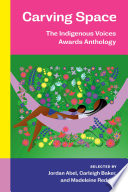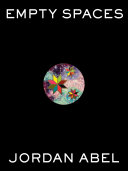Results for: jordan abel
Below is a list of 2 the books by this author.

CARVING SPACE - INDIGENOUS VOICES AWARDS
By: jordan abel | Published: May 2023
To celebrate the fifth anniversary of the Indigenous Voices Awards, an anthology consisting of selected works by finalists over the past five years,... [Read More]
To celebrate the fifth anniversary of the Indigenous Voices Awards, an anthology consisting of selected works by finalists over the past five years, edited by Jordan Abel, Carleigh Baker, and Madeleine Reddon. For five years, the Indigenous Voices Awards have nurtured the work of Indigenous writers in lands claimed by Canada. Established in 2017 initially through a crowd-funded campaign by lawyer Robin Parker and author Silvia Moreno-Garcia that set an initial fundraising goal of $10,000, the initiative raised over $116,000 in just four months. Through generous support from organizations such as Penguin Random House Canada, CELA, and others, the award has grown and have helped usher in a new and dynamic generation of Indigenous writers. Past IVA recipients include Billy-Ray Belcourt, Tanya Tagaq, and Jesse Thistle. The IVAs also help promote the works of unpublished writers, helping launch the careers of Smokii Sumac, Cody Caetano, and Samantha Martin-Bird. For the first time, a selection of standout works over the past five years of the Indigenous Voices Award will be collected in an anthology that will highlight some of the most groundbreaking Indigenous writing across poetry, prose, and theatre in English, French, and in an Indigenous language. Curated by award-winning and critically acclaimed writers Carleigh Baker, Jordan Abel, and Indigenous scholar Madeleine Reddon, this anthology will be a true celebration of Indigenous storytelling that will both introduce readers to emerging luminaries as well as return them to treasured favourites.
Theme: Anthology
- ISBN
9780771004858 - Binding
Paperback Canadian - Category
Indigenous

EMPTY SPACES
By: jordan abel | Published: August 2023
From the acclaimed, boundary-breaking author of NISHGA comes a hypnotic and mystifying exploration of land and legacy. Reimagining James Fenimore... [Read More]
From the acclaimed, boundary-breaking author of NISHGA comes a hypnotic and mystifying exploration of land and legacy. Reimagining James Fenimore Cooper’s nineteenth-century text The Last of the Mohicans from the contemporary perspective of an urban Nisga’a person whose relationship to land and traditional knowledge was severed by colonial violence, Jordan Abel explores what it means to be Indigenous without access to familial territory and complicates popular understandings about Indigenous storytelling. Engaging the land through fiction and metaphor, the successive chapters of Empty Spaces move toward an eerie, looping, and atmospheric rendering of place that evolves despite the violent and reckless histories of North America. The result is a bold and profound new vision of history that decenters human perception and forgoes Westernized ways of seeing. Jordan Abel’s extraordinary debut work of fiction grows out of his groundbreaking visual compositions in NISHGA, which integrated descriptions of the landscape from Cooper’s settler classic into his father's traditional Nisga'a artwork. In Empty Spaces, Abel reinscribes those words on the page itself, subjecting them to bold rewritings and inviting us to come to a crucial understanding: that the land knows everything that can and will happen, even as our world lurches toward uncertainty.
Theme: Indigenous
- ISBN
9780771002014 - Binding
Hardcover Canadian - Category
Adult Fiction
